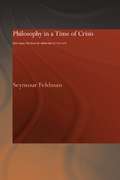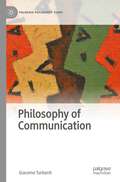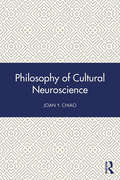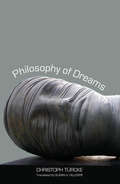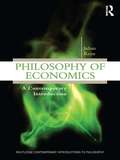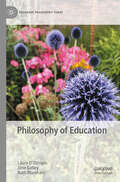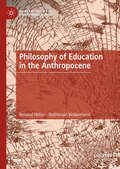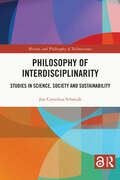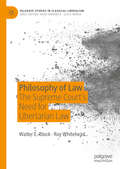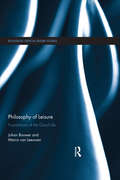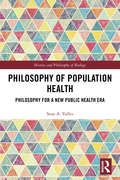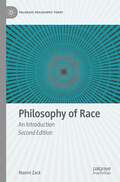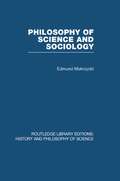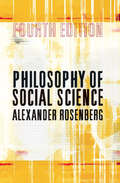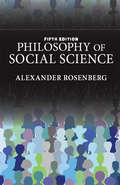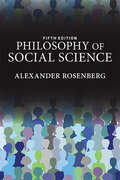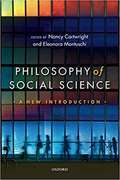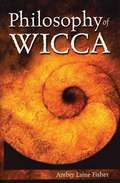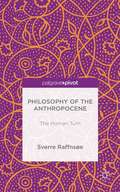- Table View
- List View
Philosophy in a Time of Crisis: Don Isaac Abravanel: Defender of the Faith (Routledge Jewish Studies Series)
by Seymour FeldmanThe expulsion from Spain did not only result in the destruction and dispersion of Spanish Jewry but led to a crisis in Jewish faith. Don Isaac Abravanel provided a systematic treatment of the main philosophical and theological beliefs of Judaism in an attempt to resolve the inner doubts of his co-religionists. In their Italian exile his son Judah too recognized that Jews were now living in a new cultural world, but he forged a different road for Jews to pursue in their entry into the culture of the Renaissance. This book presents a picture of one family facing the challenges of a new era in Jewish history.
Philosophy of Biology Before Biology (History and Philosophy of Biology)
by Charles T. Wolfe Cécilia Bognon-KüssThe use of the term "biology" to refer to a unified science of life emerged around 1800 (most prominently by scientists such as Lamarck and Treviranus, although scholarship has indicated its usage at least 30-40 years earlier). The interplay between philosophy and natural science has also accompanied the constitution of biology as a science. Philosophy of Biology Before Biology examines biological and protobiological writings from the mid-eighteenth century to the early nineteenth century (from Buffon to Cuvier; Kant to Oken; and Kielmeyer) with two major sets of questions in mind: What were the distinctive conceptual features of the move toward biology as a science? What were the relations and differences between the "philosophical" focus on the nature of living entities, and the "scientific" focus? This insightful volume produces a fresh but also systematic perspective both on the history of biology as a science and on the early versions of, in the 1960s in a post-positivist context, the philosophy of biology. It will appeal to students and researchers interested in fields such as history of science, philosophy of science and biology.
Philosophy of Care
by Boris GroysRetracing the philosophical discussions around careOur current culture is dominated by the ideology of creativity. One is supposed to create the new and not to care about the things as they are. This ideology legitimises the domination of the &“creative class&” over the rest of the population that is predominantly occupied by forms of care – medical care, child care, agriculture, industrial maintenance and so on. We have a responsibility to care for our own bodies, but here again our culture tends to thematize the bodies of desire and to ignore the bodies of care – ill bodies in need of self-care and social care.But the discussion of care has a long philosophical tradition. The book retraces some episodes of this tradition - beginning with Plato and ending with Alexander Bogdanov through Hegel, Heidegger, Bataille and many others. The central question discussed is: who should be the subject of care? Should I care for myself or trust the others, the system, the institutions? Here, the concept of the self-care becomes a revolutionary principle that confronts the individual with the dominating mechanisms of control.
Philosophy of Communication (Palgrave Philosophy Today)
by Giacomo TurbantiBy comprehensively exploring the theoretical questions raised by professional communication, this book provides an introduction to the philosophy of communication. Key Features:Arranged in three parts encompassing the theory of communication, conflict transformation and the role communication plays within organizations. Examines how agreement is reached through communication, how such agreement is negotiated between different perspectives and how such negotiation produces our organizations. Includes a full range of pedagogical features, including study questions, essay questions. chapter summaries, focus points and suggestions for further reading. Philosophy of Communication is essential reading for all students of the philosophy of communication.
Philosophy of Cultural Neuroscience
by Joan Y. ChiaoThe goal of this volume is to highlight theoretical and methodological advances in cultural neuroscience and the implications of theoretical and empirical advances in cultural neuroscience for philosophy. The study of cultural and biological factors that contribute to human behavior has been an important inquiry for centuries, and recent advances in the field of cultural neuroscience allow for novel insights into how cultural and biological factors shape mind, brain and behavior. Theoretical and empirical advances in cultural neuroscience, which investigate the origins of culture, may shed light on philosophical issues of the mind and science.
Philosophy of Dreams
by Susan H. Gillespie Christoph TurckeWhy has humankind developed so differently from other animals? How and why did language, culture, religion, and the arts come into being? In this wide-ranging and ambitious essay, Christoph Türcke offers a new answer to these timeworn questions by scrutinizing the phenomenon of the dream, using it as a psychic fossil connecting us with our Stone Age ancestors. Provocatively, he argues that both civilization and mental processes are the results of a compulsion to repeat early traumas, one to which hallucination, imagination, mind, spirit, and God all developed in response. Until the beginning of the modern era, repetition was synonymous with de-escalation and calming down. Then, automatic machinery gave rise to a new type of repetition, whose effects are permanent alarm and distraction. The new global forces of distraction, Türcke argues, are producing a specific kind of stress that breaks down the barriers between dreams and waking consciousness. Türcke’s essay ends with a sobering indictment of this psychic deregulation and the social and economic deregulations that have accompanied it.
Philosophy of Economics: A Contemporary Introduction (Routledge Contemporary Introductions to Philosophy)
by Julian ReissPhilosophy of Economics: A Contemporary Introduction is the first systematic textbook in the philosophy of economics. It introduces the epistemological, metaphysical and ethical problems that arise in economics, and presents detailed discussions of the solutions that have been offered. Throughout, philosophical issues are illustrated by and analysed in the context of concrete cases drawn from contemporary economics, the history of economic ideas, and actual economic events. This demonstrates the relevance of philosophy of economics both for the science of economics and for the economy. This text will provide an excellent introduction to the philosophy of economics for students and interested general readers alike.
Philosophy of Education (Palgrave Philosophy Today)
by Laura D’Olimpio Jane Gatley Ruth WarehamThis textbook provides an up to date, accessible introduction to the philosophy of education with a focus on the conceptual and normative questions raised by educational policy and practice. The key concepts explored include learning, teaching, indoctrination, knowledge, equality, intelligence, virtue, and rights. Clarifying the meanings of these terms is vital for educators to be able to explain what they do and why. Such conceptual analysis helps us to address normative questions about what should or should not be done, educationally speaking. Each chapter firstly examines one key concept which is then connected to a theorised aim of education. The aims considered are rationality (i.e. critical thinking), knowledge, social justice, vocational preparation, flourishing, and political participation (citizenship). These aims of education are all hotly debated, so their strengths and weaknesses are considered. Each chapter concludes with a third section connecting the key concept and aim of education under discussion to an applied example. The applied examples include religious schools, attainment gaps in education, the educational impact of the coronavirus pandemic, the curriculum, teaching ethics in schools as a form of moral education, and citizenship education. These applied examples are drawn from vital social and political issues within education. By critically engaging with and then building upon extant literature, this book demonstrates how conceptual and normative issues within education have real world implications. At the end of each chapter, there are pedagogical resources designed to support teachers and students. These include a chapter summary, a list of recommended and further readings and online resources, as well as a list of study and research questions. This book is essential reading for all undergraduate and postgraduate students of the philosophy of education. It is also ideal for use on education theory courses and will be of interest to those studying philosophy or education.
Philosophy of Education in the Anthropocene (Palgrave Studies in Educational Futures)
by Renaud Hétier Nathanaël WallenhorstThis book develops a philosophy of education for the Anthropocene, proposing that we think about education in the light of contemporary bioclimatic challenges. Education is seen as the political means of choice for containing the runaway Earth system change and ensuring the sustainability of human life in society. In this book, Hétier and Wallenhorst continue their work on the biogeophysical and socio-political analysis of the Anthropocene here, tracing the path toward the re-founding of a political education to prepare students to address the greatest challenge of our time: the gradual disappearance of the bioclimatic conditions necessary for our very existence.
Philosophy of Interdisciplinarity: Studies in Science, Society and Sustainability (History and Philosophy of Technoscience)
by Jan Cornelius SchmidtInterdisciplinarity is a hallmark of contemporary knowledge production. This book introduces a Philosophy of Interdisciplinarity at the intersection of science, society and sustainability. In light of the ambivalence of the technosciences and the challenge of sustainable development in the Anthropocene, this engaged philosophy provides a novel critical perspective on interdisciplinarity in science policy and research practice. It draws upon the original spirit of interdisciplinarity as an environmentalist concept and advocates an essential change in human-nature relations. The author utilizes the rich tradition of philosophy for case study analysis and develops a framework to disentangle the various forms of inter- and transdisciplinarity. Philosophy of Interdisciplinarity offers a foundation for a critical-reflexive program of interdisciplinarity conducive to a sustainable future for our knowledge society and contributes to fields such as sustainability sciences, social ecology, environmental ethics, technology assessment, complex systems, philosophy of nature, and philosophy of science. It injects a fresh way of thinking on interdisciplinarity – and supports researchers as well as science policy makers, university managers, and academic administrators in critical-reflexive knowledge production for sustainable development.
Philosophy of Law: The Supreme Court’s Need for Libertarian Law (Palgrave Studies in Classical Liberalism)
by Walter E. Block Roy WhiteheadLooking at discrimination, education, environment, health and crime, this volume analyses United States Supreme Court rulings on several legal issues and proposed libertarian solutions to each problem. Setting their own liberal theory of law, each chapter discusses the law at hand, what it should be, and what it would be if their political economic philosophy were the justification of the legal practice. Covering issues such as sexual harassment, religion, markets in human organs, drug prohibition and abortion, this book is a timely contribution to classical liberal debate on law and economics.
Philosophy of Leisure: Foundations of the good life (Routledge Critical Leisure Studies)
by Johan Bouwer Marco van LeeuwenWhat is leisure? How does leisure relate to leading a good life? This critical and intelligent study interrogates the basic principles of leisure and demonstrates the continuing relevance of these questions for our society today. It not only explores the traditional philosophical concepts at the heart of leisure studies, but also pursues new possibilities for reconceptualising leisure that have emerged from recent developments in society, technology and the broader discipline of philosophy itself. Approaching leisure from a philosophically inquisitive perspective, the book argues that leisure revolves around the pursuit of happiness, human flourishing and well-being, making it both a state of mind and a state of being. Its exploration of the meaning of leisure addresses key issues such as identity, ethics, spirituality, human experience, freedom, technology, embodiment, well-being, the fundamental properties of leisure and the challenge of offering a meaningful definition. Revitalising the subject of leisure studies with its originality, Philosophy of Leisure: Foundations of the Good Life is fascinating reading for all students and scholars of leisure studies, philosophy, sociology, psychology and ethics.
Philosophy of Love in the Past, Present, and Future (Routledge Studies in Contemporary Philosophy)
by André GrahleThis volume features original essays on the philosophy of love. The essays are organized thematically around the past, present, and future of philosophical thinking about love. In Part I, the contributors explore what we can learn from the history of philosophical thinking about love. The chapters cover Ancient Greek thinkers, namely Plato and Aristotle, as well as Kierkegaard’s critique of preferential love and Erich Fromm’s mystic interpretation of sexual relations. Part II covers current conceptions and practices of love. These chapters explore how love changes over time, the process of falling in love, the erotic dimension of romantic love, and a new interpretation of grand-parental love. Finally, Part III looks at the future of love. These chapters address technological developments related to love, such as algorithm-driven dating apps and robotic companions, as well as the potential of polyamory as a future romantic ideal. This book will be of interest to researchers and advanced students in moral philosophy and social and political philosophy who are working on issues related to the philosophy of love.
Philosophy of Population Health: Philosophy for a New Public Health Era (History and Philosophy of Biology)
by Sean A VallesPopulation health has recently grown from a series of loosely connected critiques of twentieth-century public health and medicine into a theoretical framework with a corresponding field of research—population health science. Its approach is to promote the public’s health through improving everyday human life: afford-able nutritious food, clean air, safe places where children can play, living wages, etc. It recognizes that addressing contemporary health challenges such as the prevalence of type 2 diabetes will take much more than good hospitals and public health departments. Blending philosophy of science/medicine, public health ethics and history, this book offers a framework that explains, analyses and largely endorses the features that define this relatively new field. Presenting a philosophical perspective, Valles helps to clarify what these features are and why they matter, including: searching for health’s "upstream" causes in social life, embracing a professional commitment to studying and ameliorating the staggering health inequities in and between populations; and reforming scientific practices to foster humility and respect among the many scientists and non- scientists who must work collaboratively to promote health. Featuring illustrative case studies from around the globe at the end of all main chapters, this radical monograph is written to be accessible to all scholars and advanced students who have an interest in health—from public health students to professional philosophers.
Philosophy of Race: An Introduction (Palgrave Philosophy Today)
by Naomi ZackPhilosophy of Race: An Introduction provides plainly written access to a new subfield that has been in the background of philosophy since Plato and Aristotle. The second edition is updated to include contemporary developments such as digital racisms, metaphysical othering and metaphysical racism, and the rise of populist movements. Its focus has also been expanded to address non-white racial groups in the Americas, Europe, and beyond, such as the Roma and Uighur people. Part I provides an overview of ideas of race and ethnicity in the philosophical canon, egalitarian traditions, race in biology, and race in American and Continental Philosophy. Part II addresses race as it operates in life through colonialism and development, social constructions and institutions, racism, political philosophy, gender, and populist movements. This book constructs an outline that will serve as a resource for students, nonspecialists, and general readers in thinking, talking, and writing about philosophy of race.
Philosophy of Race: Equality After The History Of Philosophy (Palgrave Philosophy Today)
by Naomi ZackPhilosophy of Race: An Introduction provides plainly written access to a new subfield that has been in the background of philosophy since Plato and Aristotle. Part I provides an overview of ideas of race and ethnicity in the philosophical canon, egalitarian traditions, race in biology, and race in American and Continental Philosophy. Part II addresses race as it operates in life through colonialism and development, social constructions and institutions, racism, political philosophy, and gender. This book constructs an outline that will serve as a resource for students, nonspecialists, and general readers in thinking, talking, and writing about philosophy of race.
Philosophy of Science and Sociology: From the Methodological Doctrine to Research Practice (Routledge Library Editions: History & Philosophy of Science)
by Edmund MokrzyckiOriginally published in 1983. This book concentrates on the impact of philosophy of science on sociology and other disciplines. It argues that the impact of the philosophy of science on sociology from the rise of the Vienna Circle until the mid-1980s resulted in a deep-reaching and, in the author’s view, undesirable methodological reorientation in sociology.
Philosophy of Social Science
by Alexander RosenbergRosenberg (philosophy, Duke U. ) introduces students to the philosophical foundations of the human sciences, including economics, anthropology, sociology, political science, psychology, history, and fields at the intersections of these subjects with biology. He discusses the relevance of philosophy, then the problems raised by alternative explanatory strategies, including behaviorism, structuralism, and interpretational theories like critical theory, as well as the relationship between social sciences and moral philosophy. Reorganized into 15 chapters, this edition has new chapters on philosophical anthropology, functionalism as a research program, and theories of cultural evolution; more on the role of norms and speech acts in social construction, including the work of John Searle; more on interpretive social science and continental philosophers with an expanded discussion of the critical theories of those such as Habermas, Foucault, and Bourdieu; new discussion of the role of models and equilibrium explanations in economics and the problem of spontaneous order in the creation of institutions; more on invisible hand explanations and rational choice theory in economics and political science; and an overview of Sen's capacities alternative to utilitarianism and Rawls' and other theories of development. Annotation ©2012 Book News, Inc. , Portland, OR (booknews. com)
Philosophy of Social Science
by Alexander RosenbergPhilosophy of Social Science provides a tightly argued yet accessible introduction to the philosophical foundations of the human sciences, including economics, anthropology, sociology, political science, psychology, history, and the disciplines emerging at the intersections of these subjects with biology. Philosophy is unavoidable for social scientists because the choices they make in answering questions in their disciplines force them to take sides on philosophical matters. Conversely, the social and behavior sciences must inform philosophers' understanding of human action, norms, and social institutions. The fourth edition retains an illuminating interpretation of the enduring relations between the social sciences and philosophy, and it has now been thoroughly revised to better fit courses, including fifteen chapters, with more effective transitions and helpful summaries. This edition also includes three new chapters on philosophical anthropology, functionalism as a research program, and theories of cultural evolution, as well as enhanced discussions of the role of norms and speech acts in social construction in interpretive social science and a chapter on continental philosophers of social science.
Philosophy of Social Science
by Alexander RosenbergPhilosophy of Social Science provides a tightly argued yet accessible introduction to the philosophical foundations of the human sciences, including economics, anthropology, sociology, political science, psychology, history, and the disciplines emerging at the intersections of these subjects with biology. Philosophy is unavoidable for social scientists because the choices they make in answering questions in their disciplines force them to take sides on philosophical matters. Conversely, the social and behavior sciences must inform philosophers’ understanding of human action, norms, and social institutions. The fourth edition retains an illuminating interpretation of the enduring relations between the social sciences and philosophy, and it has now been thoroughly revised to better fit courses, including fifteen chapters, with more effective transitions and helpful summaries. This edition also includes three new chapters on philosophical anthropology, functionalism as a research program, and theories of cultural evolution, as well as enhanced discussions of the role of norms and speech acts in social construction in interpretive social science and a chapter on continental philosophers of social science.
Philosophy of Social Science (Dimensions Of Philosophy Ser.)
by Alexander RosenbergPhilosophy of Social Science provides a tightly argued yet accessible introduction to the philosophical foundations of the human sciences, including economics, anthropology, sociology, political science, psychology, history, and the disciplines emerging at the intersections of these subjects with biology. Philosophy is unavoidable for social scientists because the choices they make in answering questions in their disciplines force them to take sides on philosophical matters. Conversely, the philosophy of social science is equally necessary for philosophers since the social and behavior sciences must inform their understanding of human action, norms, and social institutions.The fifth edition retains from previous editions an illuminating interpretation of the enduring relations between the social sciences and philosophy, and reflects on developments in social research over the past two decades that have informed and renewed debate in the philosophy of social science. An expanded discussion of philosophical anthropology and modern and postmodern critical theory is new for this edition.
Philosophy of Social Science, Fifth Edition
by Alexander RosenbergPhilosophy of Social Science provides a tightly argued yet accessible introduction to the philosophical foundations of the human sciences, including economics, anthropology, sociology, political science, psychology, history, and the disciplines emerging at the intersections of these subjects with biology. Philosophy is unavoidable for social scientists because the choices they make in answering questions in their disciplines force them to take sides on philosophical matters. Conversely, the philosophy of social science is equally necessary for philosophers since the social and behavior sciences must inform their understanding of human action, norms, and social institutions. The fifth edition retains from previous editions an illuminating interpretation of the enduring relations between the social sciences and philosophy, and reflects on developments in social research over the past two decades that have informed and renewed debate in the philosophy of social science. An expanded discussion of philosophical anthropology and modern and postmodern critical theory is new for this edition.
Philosophy of Social Science: A New Introduction
by Nancy Cartwright Eleanora MontuschiThis is a much-needed new introduction to a field that has been transformed in recent years by exciting new subjects, ideas, and methods. It is designed both for students with central interests in philosophy and those planning to concentrate on the social sciences, and it presupposes no particular background in either domain. From the wide range of topics at the forefront of debate in philosophy of social science, the editors have chosen those which are representative of the most important and interesting contemporary work. A team of distinguished experts explore key aspects of the field such as social ontology (what are the things that social science studies?), objectivity, formal methods, measurement, and causal inference. Also included are chapters focused on notable subjects of social science research, such as well-being and climate change. Philosophy of Social Science provides a clear, accessible, and up-to-date guide to this fascinating field.
Philosophy of Wicca
by Amber Laine FisherThis book examines and analyzes the philosophy of Wicca, and among other things discusses how Wiccans can interact with mainstream religions. Other topics include why nature is important in Wicca, an examination of the Wiccan Rede and why balance is so important in the practice of Wicca.
